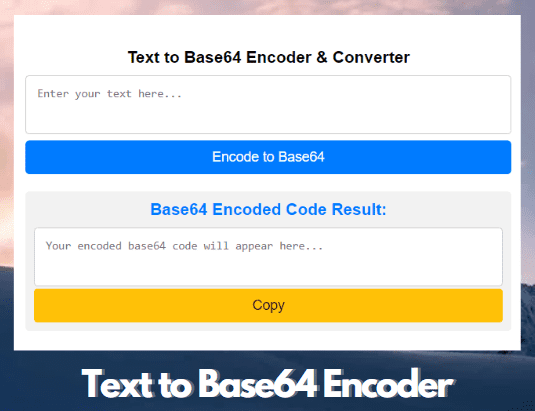Text to Base64 is a tool used for between plain text and Base64 encoding. Whether you're a seasoned developer, a cybersecurity enthusiast, or someone exploring the world of data manipulation, this tool empowers you to effortlessly encode text with just a few clicks.
How to Use Text to Base64 Encode
- Input Your Text
- Paste or type the text you want to encode in the above designated section.
- Click Encode
- Click the Encode button, and it will automatically scroll down your screen to bas64 converted code.
- Copy And Use
- Once converted, you can use base64 code in your project or whetever you want.
Pros and Cons
Pros
- Base64 encoding is safe for any kind of information, such as passwords or cryptographic keys, during data transmission.
- Base64 encoding efficiently reduces the size of data, making it for storing large volumes of information.
- The encoded data can be easily integrated into various platforms and programming languages.
- The encoding preserves the integrity of text, ensuring accurate transmission across different systems.
Cons
- Base64 encoding mostly expands the size of the data by 33%, which might can impact storage.
- Base64-encoded text appears as a string of seemingly random characters, making it challenging for humans to understand or read without decoding.
- Base64 is efficient for encoding textual data, but it is not suitable for encoding binary data or file formats.
Features
- User-Friendly Interface
- The simple design ensures easy navigation, making it accessible for users every level of users.
- Efficiency
- With swift processes, Text to Base64 saves you time and effort, allowing you to focus on your tasks at hand.
- Cross-Platform Compatibility
- Access Text to Base64 from any device with an internet connection, easily and quickly.

Frequently Asked Questions
What is Base64 encoding used for?
It is commonly used for data transmission, including email attachments, XML files, and web cookies, as well as in cryptographic applications and data storage.
Is Base64 encoding secure?
It is not a form of encryption; it merely transforms data into a different representation. While it can obfuscate data, it should not be solely relied upon for security purposes.
Can Base64 encoding be reversed?
Yes, Encoding can be reversed through decoding, restoring the original data from its encoded form.
Does Base64 encoding support Unicode characters?
Yes, encoding can handle Unicode characters, ensuring similarity with a wide range of languages and scripts.
Is Base64 encoding reversible?
Yes, it is reversible, meaning that encoded data can be decoded back to its original form without loss of information.
What is the difference between Base64 encoding and encryption?
Encoding transforms data into a different representation, whereas encryption alters data to make it unreadable without the appropriate decryption key.
Are there any size limitations for Base64-encoded data?
Encoding does not have specific size limitations, but larger encoded data may require more storage space.
Can Base64-encoded data be compressed?
The encoded text can be further compressed using standard compression algorithms.
Is Base64 encoding lossy or lossless?
The original data can be perfectly reconstructed from its encoded form without any loss of information.
Are there alternatives to Base64 encoding?
Yes, there are alternative encoding such as Base32, hexadecimal encoding, and binary-to-text encoding, each with its own advantages and use cases.